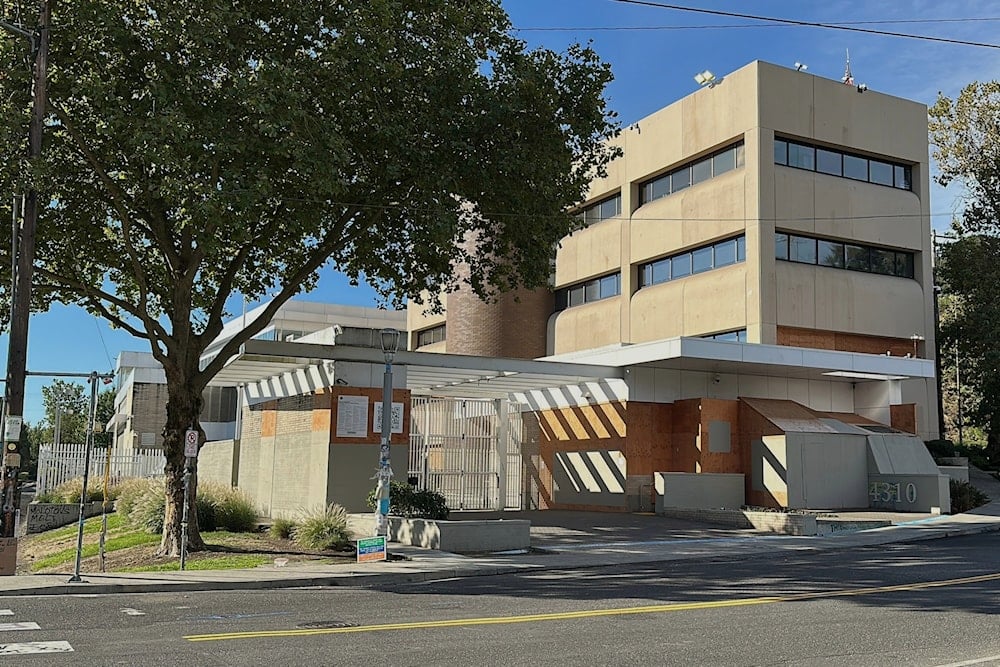Trump sends troops to Portland, ICE facilities
US President Trump directs federal troops to Portland to protect immigration sites, citing Antifa threats, while Oregon officials deny the need for military action.
-

A U.S. Immigration and Customs Enforcement facility is shown on Saturday, September 27, 2025, in Portland, Oregon. (AP)
US President Donald Trump announced on Saturday that he was directing the US military to deploy to Portland, Oregon, and to protect federal immigration facilities against what he termed "domestic terrorists," authorizing them to use what he described as "full force, if necessary."
In a social media post that escalated his administration's actions against the city, Trump stated he had instructed War Secretary Pete Hegseth to deploy every required soldier for the defense of Portland, and to safeguard any immigration enforcement facilities, which he claimed were being besieged by the group Antifa, along with other domestic terrorist elements.
Last week, President Trump signed an executive order designating the anti-fascist Antifa movement as a domestic terrorist organization, a move presented as part of his administration's crackdown on what he claims is left-wing political violence.
Then, on Thursday, he addressed reporters, stating without evidence that what he termed "crazy people," "professional agitators," and "anarchists" were attempting to burn buildings in Portland.
Portland officials deny need for deployments
"The number of necessary troops is zero, in Portland and any other American city. The president will not find lawlessness or violence here unless he plans to perpetrate it," Mayor of Portland Keith Wilson stated.
Preliminary data from the Major Cities Chiefs Association shows a drop in violent crime in Portland during the first six months of 2025, with homicides falling by 51% compared to the same period a year earlier. Based on the report, Portland recorded 17 homicides, a figure that stands in contrast to the 56 homicides in Louisville, Kentucky, and the 124 homicides in Memphis, Tennessee, cities with similar population sizes.
During a Saturday press conference, Oregon's Democratic Governor Tina Kotek rejected the necessity for troops, stating she had communicated this position directly to both President Trump and Homeland Security Secretary Kristi Noem.
"There is no insurrection, there is no threat to national security, and there is no need for military troops in our major city," Governor Kotek stated, adding that "I'm going to continue communicating that to the president, and I hope he will be open to reconsidering the deployment."
US Senator Ron Wyden, an Oregon Democrat, suggested on social media platform X that Trump's decision to send troops into Portland might be a repetition of his 2020 strategy, intended not to keep peace but to deliberately incite confrontation and violent clashes.
Following the killing of George Floyd in Minneapolis in 2020, prolonged protests emerged in downtown Portland. Demonstrations continued for months, with some contemporary civic leaders asserting that the presence of federal troops sent by Trump actually inflamed the situation rather than suppressing it.
Tension over potential use of lethal force
The ambiguity surrounding Trump's "full force" warning for troops in Portland left it unclear if he was authorizing lethal measures and under what specific circumstances, given that domestic deployments typically only permit the use of force in self-defense.
The Pentagon provided no details to clarify whether the deployment to Portland would consist of National Guard units, active-duty military personnel, or a combination of both, a strategy previously employed in Los Angeles earlier in the year.
"We stand ready to mobilize US military personnel in support of DHS operations in Portland at the President’s direction. The Department will provide information and updates as they become available," Pentagon spokesperson Sean Parnell told Reuters.
When questioned about the deployment decision, Department of Homeland Security spokesperson Tricia McLaughlin stated that the protection of ICE agents was necessary due to ongoing protests against recent immigration raids.

 4 Min Read
4 Min Read










